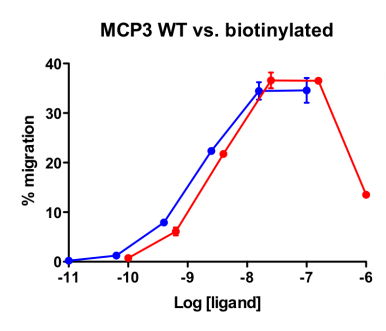Biotinylated Human CCL7 (MCP-3)
|
Stock Sizes: 2ug, 10ug, 50ug, 100ug, and 1mg
Also available in custom sizes, email for a custom quote. |
BACKGROUND
Monocyte chemotactic protein 3 (MCP-3/CCL7) is secreted by monocytes and certain tumor cell lines. It is a chemoattractant for monocytes and other leukocytes. MCP-3 binds and signals through several chemokine receptors including CCR1, CCR2, CCR3, and appears to be an antagonist for CCR5.
Biotinylated CCL7 is made using the enzymatic method, which has several advantages over chemical biotinylation methods. The attachment of biotin at a specific lysine residue leads to a modified chemokine with functionalities comparable to those of the unmodified CCL7 in migration assay. Combining with avidin analogues conjugated to various fluorescent labels, biotinylated CCL7 is useful in studies on receptor identification, distribution, chemokine binding, and other cellular assays. They serve as great tools in visualization and quantification, and replace the needs for radioactively labeled chemokines.
Monocyte chemotactic protein 3 (MCP-3/CCL7) is secreted by monocytes and certain tumor cell lines. It is a chemoattractant for monocytes and other leukocytes. MCP-3 binds and signals through several chemokine receptors including CCR1, CCR2, CCR3, and appears to be an antagonist for CCR5.
Biotinylated CCL7 is made using the enzymatic method, which has several advantages over chemical biotinylation methods. The attachment of biotin at a specific lysine residue leads to a modified chemokine with functionalities comparable to those of the unmodified CCL7 in migration assay. Combining with avidin analogues conjugated to various fluorescent labels, biotinylated CCL7 is useful in studies on receptor identification, distribution, chemokine binding, and other cellular assays. They serve as great tools in visualization and quantification, and replace the needs for radioactively labeled chemokines.
|
SPECIFICATIONS
Source: E. coli derived Accession # P80098-2 (24-99) Modification: Biotin at C-Terminal Formulation: Lyophilized Carrier Protein: None Predicted Molecular Mass: 11.374 kDa Extinction Coefficient: 14,180 M-1 cm-1 Actual Molecular Mass: 11.374 kDa by ESI Mass Spec Endotoxin Level: <0.01 EU per 1μg of the protein by the LAL method Purity: > 97% by SDS PAGE PREPARATION AND STORAGE Reconstitution: Spin sample prior to resuspension. Recommended at 100μg/mL in sterile water Shipping: Room Temp Stability and Storage: Avoid repeated freeze-thaw cycles • 12 months from date of receipt, -20 to -70 °C as supplied. • ChemoTactics suggests using immediately after reconstitution. • 1 month, -20 to -70 °C under sterile conditions after reconstitution. |
Migration Assay: Cells expressing recombinant CCR2 were assayed for migration through the Transwell bare filter at various concentrations of MCP-3. The response is expressed as the % of total input cells (Blue: wild type; Red: biotinylated).
Migration Assay Protocol Activity: EC50 = 1.4-2.6nM determined by migration assay with cells expressing recombinant CCR2 cells
|
For bulk orders or custom sizes, please contact us and we can provide this for you.
|
|
|
|
|
|
REFERENCES
1. “Monocyte chemotactic protein-3” Menten P., Wuyts A., Van Damme J. Eur. Cytokine Netw. 12:554-560 (2002)
2. "Human monocyte chemotactic protein-3 (MCP-3): molecular cloning of the cDNA and comparison with other chemokines".
Opdenakker G., Froyen G., Fiten P., Proost P., Van Damme J. Biochem. Biophys. Res. Commun. 191: 535–42 (1993)
3. "CCR5 binds multiple CC-chemokines: MCP-3 acts as a natural antagonist." Blanpain C., Migeotte I., Lee B., Vakili J., Doranz B.J., Govaerts C., Vassart G., Doms R.W., Parmentier M.Blood 94:1899-1905 (1999)
1. “Monocyte chemotactic protein-3” Menten P., Wuyts A., Van Damme J. Eur. Cytokine Netw. 12:554-560 (2002)
2. "Human monocyte chemotactic protein-3 (MCP-3): molecular cloning of the cDNA and comparison with other chemokines".
Opdenakker G., Froyen G., Fiten P., Proost P., Van Damme J. Biochem. Biophys. Res. Commun. 191: 535–42 (1993)
3. "CCR5 binds multiple CC-chemokines: MCP-3 acts as a natural antagonist." Blanpain C., Migeotte I., Lee B., Vakili J., Doranz B.J., Govaerts C., Vassart G., Doms R.W., Parmentier M.Blood 94:1899-1905 (1999)
Support: [email protected]
For Research use only, Not for use in Humans.
For Research use only, Not for use in Humans.




